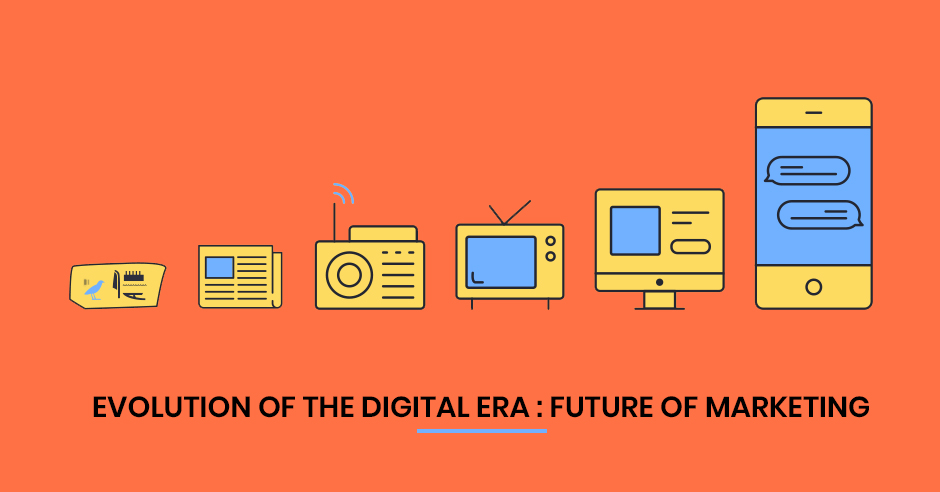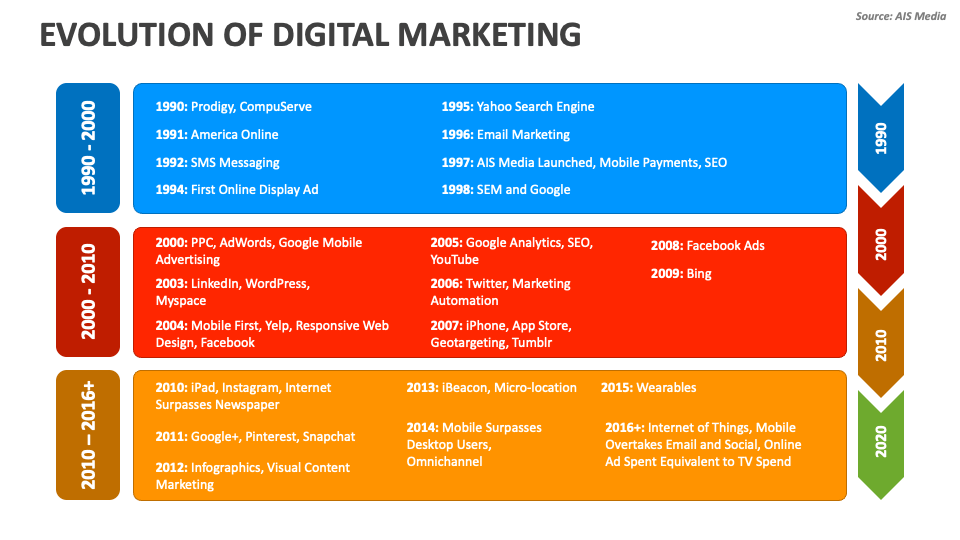
The Evolution of Digital Marketing: Key Insights for Today
Digital marketing has undergone a significant transformation since its inception, shaped by technological advancements, changing consumer behaviors, and the evolving digital landscape. Today, digital marketing is an essential component of any successful business strategy, enabling companies to reach their target audience more effectively and efficiently. This blog explores the evolution of digital marketing and provides key insights for businesses looking to thrive in the modern digital era.
The Early Days: The Birth of Digital Marketing

The roots of digital marketing can be traced back to the early 1990s with the advent of the internet. The first clickable banner ad, launched in 1993, marked the beginning of online advertising. This period was characterized by simple, static websites and basic email marketing campaigns. The focus was primarily on building an online presence and reaching a global audience.
The Rise of Search Engines: SEO and SEM
The late 1990s and early 2000s saw the rise of search engines like Google, which revolutionized how information was accessed online. This era introduced Search Engine Optimization (SEO) and Search Engine Marketing (SEM) as crucial components of digital marketing. Businesses began optimizing their websites to rank higher in search engine results, driving organic traffic. Paid search advertising also became popular, allowing businesses to bid for ad placements on search engine results pages (SERPs).
Social Media Revolution
The mid-2000s witnessed the emergence of social media platforms like Facebook, Twitter, and LinkedIn, which transformed digital marketing strategies. Social media marketing allowed businesses to engage directly with their audience, build brand loyalty, and leverage user-generated content. The viral nature of social media content provided unprecedented opportunities for brand visibility and customer engagement.
Content is King: The Rise of Content Marketing
Content marketing gained prominence as businesses realized the importance of providing valuable, relevant, and consistent content to attract and retain a clearly defined audience. Blogging, infographics, videos, and eBooks became popular content formats. The focus shifted from direct selling to building trust and authority through informative and engaging content.
Mobile Marketing: The Smartphone Era
With the proliferation of smartphones in the 2010s, mobile marketing became a critical aspect of digital marketing. Mobile-responsive websites, mobile apps, and SMS marketing enabled businesses to reach consumers on the go. The advent of mobile payment systems further facilitated seamless transactions, enhancing the overall customer experience.
Data-Driven Marketing: Analytics and Personalization
The digital age brought an explosion of data, enabling businesses to gain deep insights into consumer behavior. Advanced analytics tools allowed marketers to track and measure the effectiveness of their campaigns in real-time. Personalization became a key strategy, with businesses leveraging data to deliver tailored experiences to individual customers. This era also saw the rise of marketing automation tools, streamlining repetitive tasks and enhancing efficiency.
The Age of Influencers: Influencer Marketing
Influencer marketing emerged as a powerful strategy, leveraging the reach and credibility of social media influencers to promote products and services. Brands partnered with influencers who had a substantial following and could authentically connect with their audience. This form of marketing proved highly effective in building brand awareness and driving sales.
Video Marketing: The Dominance of Visual Content
Video marketing gained immense popularity with the rise of platforms like YouTube, Instagram, and TikTok. Videos became a preferred content format due to their ability to convey messages quickly and engagingly. Live streaming and video storytelling became essential tools for brands to connect with their audience on a deeper level.
The Present Era: Integrated Digital Marketing Strategies
In today’s digital landscape, an integrated approach to digital marketing is crucial. Businesses must leverage a combination of SEO, SEM, social media marketing, content marketing, email marketing, and more to create a cohesive and effective strategy. Here are some key insights for businesses looking to thrive in the present era of digital marketing:
1. Embrace Omnichannel Marketing
Consumers interact with brands across multiple channels, including social media, email, websites, and physical stores. An omnichannel approach ensures a seamless and consistent experience across all touchpoints. Integrating online and offline marketing efforts can enhance brand visibility and customer loyalty.
2. Leverage Artificial Intelligence and Machine Learning
AI and machine learning are transforming digital marketing by enabling predictive analytics, chatbots, personalized recommendations, and more. Businesses can use AI to analyze vast amounts of data, optimize campaigns in real-time, and deliver highly personalized experiences to their customers.
3. Focus on Customer Experience
Customer experience (CX) is a critical differentiator in the digital age. Businesses must prioritize delivering exceptional experiences at every stage of the customer journey. This involves understanding customer needs, providing personalized interactions, and addressing pain points promptly.
4. Invest in High-Quality Content
Content remains a cornerstone of digital marketing. Creating high-quality, valuable content that resonates with your audience is essential. This includes blog posts, videos, infographics, podcasts, and more. Consistent, engaging content helps build trust and authority in your industry.
5. Utilize Data Ethically and Transparently
With increasing concerns about data privacy, businesses must handle customer data ethically and transparently. Implementing robust data protection measures and being transparent about data usage can build trust and credibility with your audience.
6. Stay Agile and Adapt to Change
The digital landscape is constantly evolving, with new technologies, platforms, and consumer behaviors emerging regularly. Businesses must stay agile and be willing to adapt their strategies to stay ahead of the curve. Continuous learning and experimentation are key to success.
7. Measure and Optimize Performance
Regularly measuring and analyzing the performance of your digital marketing efforts is crucial. Use analytics tools to track key metrics, identify areas for improvement, and optimize your campaigns for better results. Data-driven decision-making can significantly enhance the effectiveness of your marketing strategies.
Conclusion
The evolution of digital marketing has been marked by rapid advancements and paradigm shifts, from the early days of static websites to the present era of integrated, data-driven strategies. Today, businesses have an array of tools and technologies at their disposal to reach and engage their target audience more effectively than ever before. By embracing omnichannel marketing, leveraging AI, focusing on customer experience, creating high-quality content, using data ethically, staying agile, and continuously measuring performance, businesses can navigate the complexities of the modern digital landscape and achieve sustainable growth.



